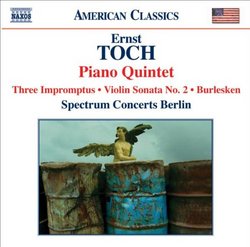| All Artists: Toch, Spectrum Concerts Berlin, Dodge, Blumenthal, von Hehn, Kretz, Rohde Title: Toch: Piano Quintet Members Wishing: 0 Total Copies: 0 Label: Naxos American Classics Original Release Date: 1/1/2008 Re-Release Date: 4/29/2008 Genre: Classical Styles: Chamber Music, Historical Periods, Classical (c.1770-1830) Number of Discs: 1 SwapaCD Credits: 1 UPC: 636943932421 |
Search - Toch, Spectrum Concerts Berlin, Dodge :: Toch: Piano Quintet
 | Toch, Spectrum Concerts Berlin, Dodge Toch: Piano Quintet Genre: Classical
|
Larger Image |
CD Details |
CD ReviewsPerfect Intro for an Outstanding "Lost" Composer John H. Beck | NYC/USA | 11/11/2008 (5 out of 5 stars) "Whether music for you is simply an expansive pleasure, or a guide to times past and the emotional progress of humanity, Ernst Toch is an important composer. This album represents well his first career, as a famous Austrian-born German composer, someone who had to grapple with the destruction and misery brought by the Great War (he fought on the Austrian-Italian front, especially miserable because it has been so forgotten -- see Mark Helprin's novel A Soldier of the Great War). How could you keep writing Brahms or Wagner (or Sibelius, Elgar, Debussy) after such a catastrophe, and with hyper-inflation, and murderous political infighting between fascists and bolsheviks (real ones, not just casual campus epithets).
His Burleske, three short piano pieces, show the perhaps unsustainable but brilliant energy of the early 1920s. His Violin Sonata No. 1, from 1928, is a tough and smart and beautiful like, say, the young Marlene Dietrich off camera. And then, ten years later, Toch having narrowly escaped from Austria, this great Piano Quintet with its Our Town-ish movement designations ("The Lyrical Part," "The Whimsical Part," "The Contemplative Part," "The Dramatic Part"). It is the exquisitely felt expression of a man torn from his roots, indeed with many of his family left behind eventually to be destroyed. Austria is on the cusp of annexation into Hitler's Reich, and one sits far away, in English-speaking lands, and writes--for whom? Toch became a noted composer for Hollywood and continued as an important teacher. (He himself had been self-taught, from the Mozart String Quartets.) But he had no more real stage; Americans, a few of them, applauded politely, but how many could even hear him? Nevertheless, after a heart attack, he rose up to resume his excellent string quartets and seven symphonies. The Impromptus, here in their cello version, come from his last months. Spectrum Concerts Berlin has focused on Toch for several years, and these consistently fine performances show that engagement with Toch's language and life. The Sonata in particular may take some listening-into, after which it becomes quite exhilarating. And even if you yourself "shut down" as a listener at the death of Brahms, the Parnassus of chamber music composers, or Debussy, these other three pieces will speak to you immediately and deeply. From here you can go on to Spectrum's other Toch album Tanz-Suite and Cello Concerto, or to the fine symphony and string quartet cycles that have finally appeared in this decade." |

 Track Listings (13) - Disc #1
Track Listings (13) - Disc #1